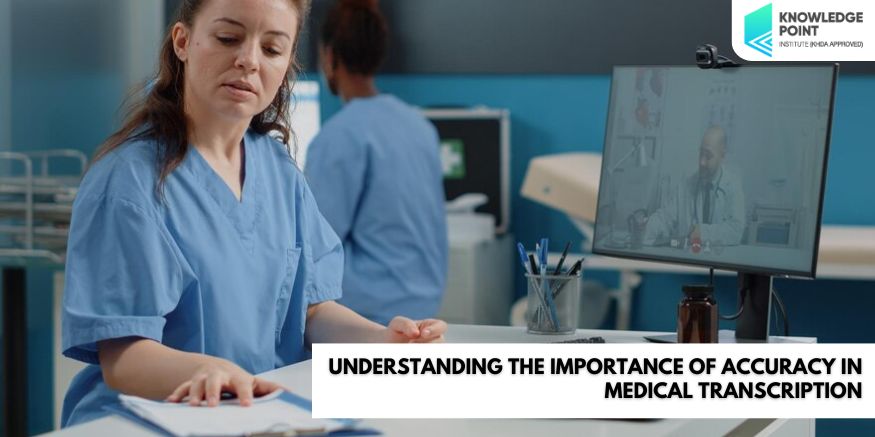
At Knowledge Point Institute, we understand the critical role that accuracy plays in medical transcription. Our commitment to excellence drives us to emphasize the importance of accuracy in every aspect of our training and practice. In this blog post, we will delve into why accuracy is paramount in medical transcription and how it impacts patient care, healthcare providers, and the overall healthcare system.
Ensuring Patient Safety:
- Accurate medical transcription is directly linked to patient safety. Mistakes in transcribing medical records, such as incorrect dosages, procedures, or patient information, can have serious consequences for patients.
- Misinterpreted information could lead to incorrect treatments, medication errors, or delayed care, all of which jeopardize patient well-being.
- By prioritizing accuracy in transcription, we help ensure that healthcare professionals have reliable and precise information to make informed decisions about patient care.
Maintaining Legal and Ethical Standards:
- In the healthcare industry, adherence to legal and ethical standards is non-negotiable. Medical transcriptionists must accurately capture and document patient encounters, diagnoses, treatments, and other medical information in compliance with privacy laws and regulations.
- Our training programs at Knowledge Point Institute emphasize the importance of confidentiality, accuracy, and ethical behavior in medical transcription to uphold professional standards and protect patient privacy rights.
Facilitating Effective Communication:
- Accurate medical transcription serves as a vital communication tool among healthcare professionals. Transcribed medical records serve as a permanent record of patient history, treatments, and outcomes, facilitating continuity of care among different healthcare providers.
- Errors or inaccuracies in transcription can lead to misunderstandings or miscommunications between healthcare teams, potentially impacting treatment plans and patient outcomes. By focusing on accuracy, we enable seamless communication and collaboration within the healthcare system.
Enhancing Efficiency and Productivity:
- Inaccuracies in medical transcription can result in wasted time and resources for healthcare providers. Physicians and clinicians rely on accurate transcriptions to review patient histories, make diagnoses, and develop treatment plans efficiently.
- When transcriptions are inaccurate or incomplete, healthcare professionals may need to spend additional time clarifying information or correcting errors, leading to delays in patient care and decreased productivity.
- Our training programs emphasize accuracy alongside efficiency to equip medical transcriptionists with the skills needed to deliver high-quality work within reasonable timeframes.
Improving Billing and Reimbursement Processes:
- Accurate medical transcription also plays a crucial role in billing and reimbursement processes within healthcare organizations.
- Proper documentation of medical services provided is essential for accurate billing, coding, and reimbursement from insurance companies or government agencies. Inaccuracies or inconsistencies in medical records can result in billing errors, claim denials, or audits, impacting the financial stability of healthcare providers and organizations.
- By prioritizing accuracy, we help ensure that billing and reimbursement processes run smoothly and accurately reflect the services rendered to patients.
Reducing Legal Risks:
- Inaccurate or incomplete medical records can pose legal risks to healthcare providers and organizations. In legal proceedings or medical malpractice cases, detailed and accurate medical documentation serves as evidence to support or defend healthcare decisions and actions.
- Errors or discrepancies in medical records can undermine credibility and raise legal liabilities. By promoting accuracy in medical transcription, we help mitigate legal risks and support the integrity of medical documentation in legal contexts.
Embracing Technology for Accuracy:
- At Knowledge Point Institute, we recognize the role of technology in enhancing accuracy in medical transcription.
- Speech recognition software, electronic health records (EHRs), and advanced editing tools can streamline the transcription process and reduce the likelihood of errors. However, medical transcriptionists must understand how to use these technologies effectively while maintaining accuracy and quality standards.
- Our training programs incorporate hands-on experience with relevant tools and technologies to prepare students for the evolving landscape of medical transcription.
Continuous Learning and Quality Improvement:
- Achieving and maintaining accuracy in medical transcription requires a commitment to continuous learning and quality improvement.
- Medical terminology, industry standards, and healthcare practices evolve, requiring transcriptionists to stay updated and adapt to changes.
- Our curriculum at Knowledge Point Institute includes ongoing training, professional development opportunities, and quality assurance measures to ensure that our graduates meet the highest standards of accuracy and professionalism in medical transcription.
Conclusion:
In summary, accuracy is not just a goal but a fundamental requirement in medical transcription. From safeguarding patient safety and maintaining legal compliance to enhancing communication and efficiency, accurate transcription plays a multifaceted role in the healthcare ecosystem. At Knowledge Point Institute, we instill the importance of accuracy in every aspiring medical transcriptionist, equipping them with the knowledge, skills, and ethical foundation to excel in this critical healthcare support role. By prioritizing accuracy, we contribute to improved patient outcomes, streamlined healthcare processes, and enhanced quality of care across the healthcare industry.
